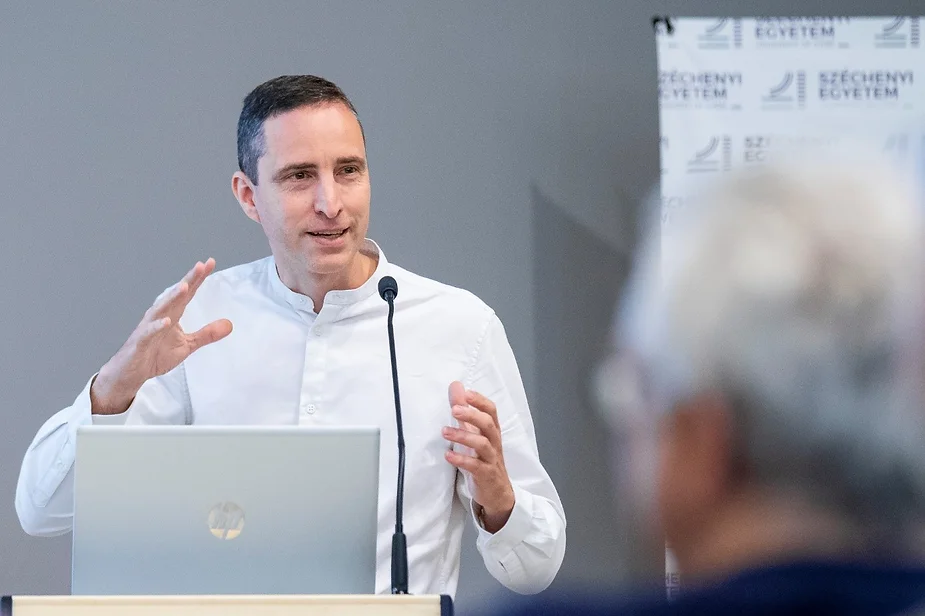Skills development and project-based learning are focus of SZE’s educational reform
Placing students at the centre, the University has embarked on a comprehensive overhaul of its programmes. The institution aims to enhance the quality of its practical education while developing young people's skills and increasing learning efficiency through new methodologies. By 2030, all the University’s programmes are expected to include project-based learning modules.
Széchenyi István University has initiated a comprehensive educational reform to support students in acquiring practical knowledge that meets labour market expectations in the most effective way. The goal is to introduce and expand the latest educational methodologies that consider generational characteristics, organize competency assessments for freshers and graduates, develop students' skills, and integrate project-based learning into the curriculum. These initial results and future tasks were presented to educators and market partners at a conference held in the framework of the European Union project RRF-2.1.2-21-2022-00028, Infrastructure and Skill Development for Practice-Oriented Training at Széchenyi István University.

Dr. Zsolt Kovács, Vice President for General and Educational Affairs at Széchenyi István University, opened the University's educational development conference. (Photo: Máté Dudás)
"Our task does not begin with first-year students, but much earlier. We need to assist schoolchildren with career orientation and offer flexible, innovative, and student-friendly programmes to admitted students with the involvement of our partners," stated Dr Zsolt Kovács, Vice President for General and Educational Affairs. He emphasized that what worked well ten years ago is no longer applicable today, as young people's perspectives, motivations, and competencies have changed. "Our students are capable of great achievements if given the right tasks. Just consider the recent world record set by the SZEnergy Team in electromobility," he noted. He added that frontal teaching is increasingly being replaced by project-based learning, which they aim to expand at the University in Győr.
As part of the reform, the institution is introducing the Student Competency Development Programme and the Student Project Support Programme. Dr Gergő Gajzágó, Assistant Professor at the Kautz Gyula Faculty of Economics, explained that project-based learning is an excellent method for effective knowledge transfer as it is practice-oriented and experiential. "Since solutions to real problems need to be sought, it teaches well-founded, conscious decision-making and increases students' professional dedication," he noted. They plan to launch pilot courses in the 2024–25 academic year, introduce project-based learning in 12 undergraduate programmes the following year, and eventually extend it to all programmes. The process will be supported by the Student Project Support Programme and the establishment of a tutoring system.

Dr Gergő Gajzágó, senior lecturer at the Kautz Gyula Faculty of Economics, presented the Student Project Support Programme. (Photo: Máté Dudás)
Dóra Horváth, Training Advisor at the Methodology, Digital, and Teacher Training Directorate, introduced the Student Competency Development Programme. She mentioned that the challenges of recent years, including the online education implemented during the coronavirus pandemic, have led to a lack of certain skills in this generation, putting them at a disadvantage through no fault of their own. As a first step, a training programme was launched with over a hundred engineering and business informatics students participating. Students were invited based on specific criteria, but they could also join voluntarily. In addition to engineering competencies, various skills were developed in areas such as collaboration, teamwork, and problem-solving. "The programme aims to reduce dropout rates, to support student progress, improve learning and teaching methodologies, to conduct regular competency assessments for incoming and outgoing students, and to extend project-based learning," she emphasized.

Dóra Horváth, Training Advisor at the Methodology, Digital, and Teacher Training Directorate, gave an overview of plans related to the Student Competency Development Programme. (Photo: Máté Dudás)
Dr Éva Happ, Associate Professor at the Kautz Gyula Faculty of Economics, called on industry partners to contribute to the development of a competency map by degree programme, as their feedback significantly enhances the quality of training. She highlighted the introduction of a socialization semester to aid students' integration into university life. "We support the enhancement of university life with courses and training, aiming to strengthen student relationships," she noted. Additionally, advisory boards will be established for each degree programme, relying on the participation of market partners, who can also motivate future professionals through internships, student research topics, consultations, and project tasks.
The leader responsible for training development briefly introduced the upcoming Student to Develop software, which will be particularly important for students involved in university projects. "With this, graduates can receive a project portfolio along with their diploma, serving as an excellent reference on the labour market," she explained. Finally, she mentioned that the software would include competency assessment, which is planned to start as early as September this year.

Dr Éva Happ, Associate Professor at the Kautz Gyula Faculty of Economics, summarized the current tasks of training development. (Photo: Máté Dudás)











